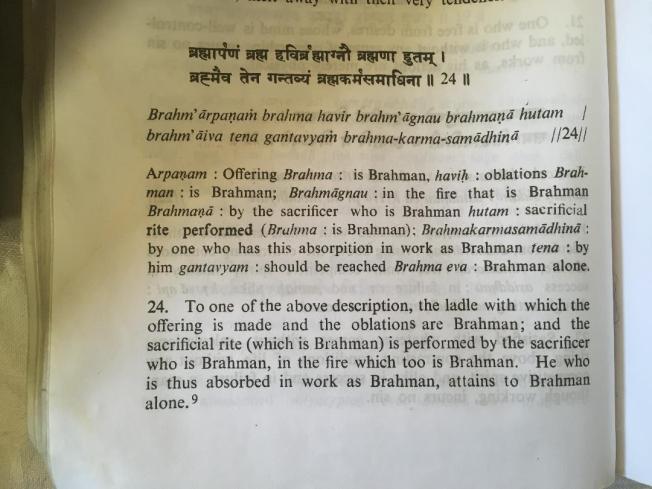4.24
brahmārpaṇaṁ brahma havir brahmāgnau brahmaṇā hutam
brahmaiva tena gantavyaṁ brahma-karma-samādhinā
brahmārpaṇaṁ – offering to brahma
brahma havir – oblation to Brahma
brahmāgnau – to the fire that is brahma
brahmaṇā hutam – when called summoned invited by the priests (brahmana)
Brahmaiva – to brahma certainly
tena – when brings about (tena)
gantavyaṁ – an hour in time unknown to free us from sorrow (ganta/hour avyadha/freedom from sorrow)
brahma-karma-samādhinā – that is the brahma karma samadhina.
Brahama-karma-samadhina- where we go in the end, or our grave in the end is samadhina. our spiritual process there upon. The fire that is also the brahman. The word samaadhi literally means grave in Sanskrit, but Hindu’s do not bury their dead. The word samadhi also implies contemplation and self-reflection after renouncing from this world. Meaning after being gone, perhaps for Hindus, that samadhi is brahma (approach to God) since there is no other way of understanding grave in a literal sense. People in Hinduism have also experienced Samadhi through mediation. This idea of “grave” might symbolize one and the same. The words brahama-karma-samdhina reflect this.
What it says in Gita.

I have questions about this, the word to word analysis of what is written in Gita.
The full meaning written in Gita for it.
To one of the above description, the ladle with which offering is made and the oblations are brahman. And the sacrificial rite (which is brahman) is performed by the sacrificer who is brahman, the fire which too is brahman. He who is thus absorbed in the work as Brahman, attains to Bhrahman alone.
What is “to the one above description,” there are no sanskrit words written like that in the verse. The ladle (long spoon) which offering is made, the oblations to brahman, this so called sacrificial rite with the ladle to the fire is brahman?. There are no Sanskrit words in the verse describing this ladle. I don’t believe this is brahman or performed by the sacrificer who is brahman so then each of us are now brahman? A person absorbed in this work or sacrificial rite “as brahman” attains brahman alone? What was in the book made no sense to me.
I do not think they are talking about the food as an offering, more like the sacrificial rites offered to Brahman which too, is the fire.
Hindus do perform sacrificial rites to agni. The person performing the sacrifice is not brahman, he is brahmana. The meaning of Hutam is called or summoned or invited during this sacrificial rites. Hindus do have a word for food in sanskrit that is Anna. I don’t think this sacrifice rites performed with the ladle have anything to do with food we physically consume, it even says it for the fire that is brahman. I don’t believe we are called the sacrificer that is brahaman, there are many other terms in Sanskrit to describe our experience and existence here, example jiva, manava etc. and other terms used alongside with other Sanskrit words and philosophy. Our absorption of work is not brahman we have other sanskrit terms to describe that work and or actions such as karma etc. If brahman is consciousness and ultimate reality believed by the non – dualists how is it he alone attain brahman? And is it “he”? Does the verse specify that?